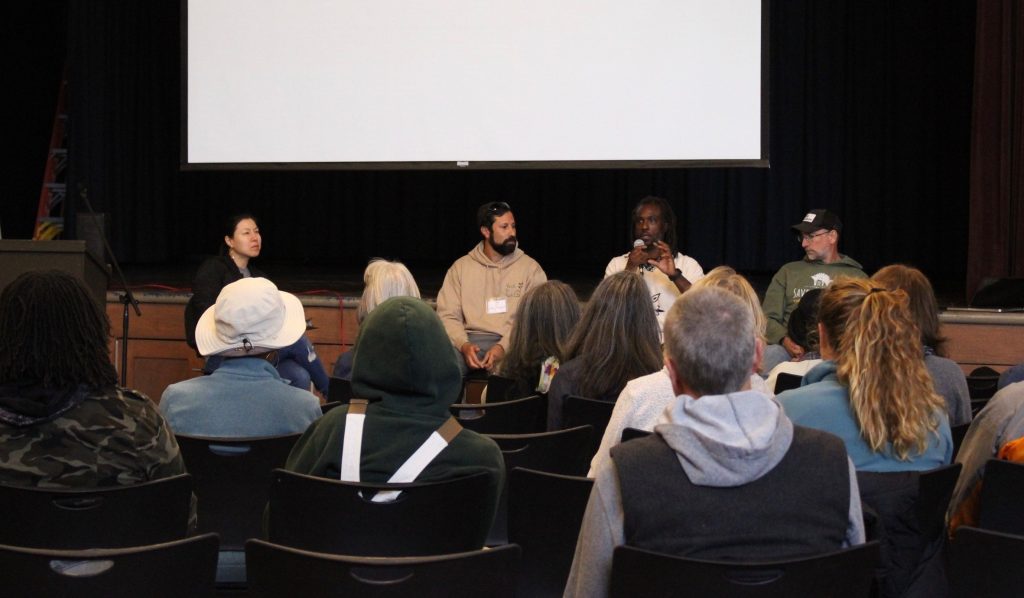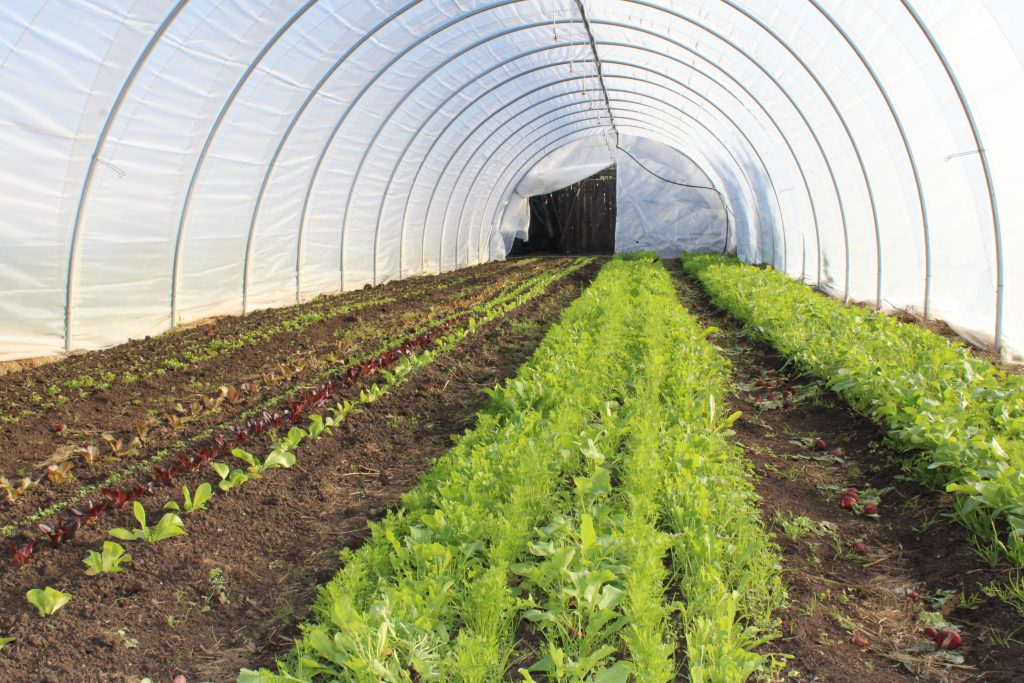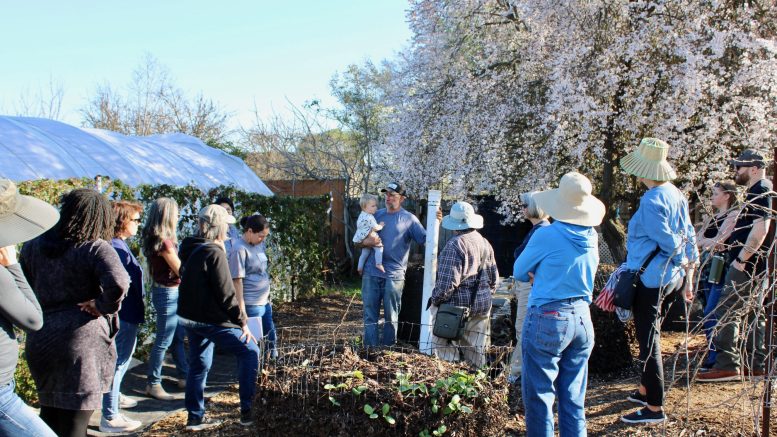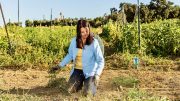By Annie Biebl
From a plot the size of a small backyard to one spanning several acres, the possibilities for farmers and gardeners — both urban and rural — are truly endless.
That’s the perspective shared by several urban farm leaders who addressed more than 45 attendees at the “Edible Landscape” workshop hosted by The Center for Land-Based Learning (CLBL) on Saturday, March 8.
Farmers and gardeners from all across Northern California gathered at the Bryte Career & College Training campus in West Sacramento, with attendees traveling from locations such as the Bay Area, Grass Valley and Davis.
The one-day workshop was designed to help home gardeners and farmers enhance their edible landscapes, boost crop yields, explore creative growing techniques for limited spaces, and gain new agricultural and business skills.
Shawn Harrison, co-founder of Soil Born Farms in Rancho Cordova, kicked off the workshop with a presentation on climate adaptation strategies aimed at helping farmers leverage their climates and resources. Harrison said his goal is to inspire and empower individuals to grow food in small spaces, ranging from backyards to school gardens.
Harrison emphasized that the principles and practices he shared are adaptable to any scale, pointing out that smaller spaces often provide an easier path to creating landscapes that are resilient, adaptable and sustainable.
“The stories and practices that we’re talking about really do apply to every scale, and the smaller the space [you have] the more tools that you have at your disposal,” Harrison said.
The workshop featured an urban farm and garden panel composed of three urban farm leaders, including Root 64 owner Randy Stannard, Yisrael Farms founder Chanowk Yisrael and Yard to Fork founder Jason Perdichizzi.

Moderator Hanna Kahl, a senior manager at the Community Alliance with Family Farmers (CAFF), asked the panelists to share their farming experiences, including both the successes and the challenges. The panel covered a wide range of farming strategies and shared tips on growing healthy crops efficiently. And while the panelists came from different farming experiences and backgrounds, they all agreed on one thing: A farmer’s attitude and mindset are key.
Yisrael, who founded the eponymous half-acre urban farm in Sacramento, has since expanded to multiple locations, using agriculture to engage the community and create opportunities for connection. He spoke about the importance of connecting with young people, emphasizing the need to design programs that tap into their interests, like working with animals.
“If you’re gonna open up to young people, you need to have those [understandings] that they’re probably not gonna care much about herbs, but they’re really gonna like worms and they’re gonna really like the chickens,” he said.
Yisrael pointed out that kids can sometimes be hesitant to engage, but once they’re immersed in the environment, they start to relax as their natural curiosity takes over. “Having things that they can taste and touch make it a kinesthetic experience and they have a good time,” he said.
Yisrael shared that gardens have long been more than just spaces for growing food; they’ve also served as gathering places. In this spirit, Yisrael Farms hosts a variety of events, from small weddings and cacao ceremonies to yoga sessions. He said that his farms also offer a safe space for activists and protesters to come together and unwind, as well as for those dealing with mental health challenges.
Jeremy Watts, owner of Edible Ecology in Richmond, shared his expertise with the group through a presentation on cultivating healthy soils and boosting biological activity to grow more vibrant, productive crops.
“It’s really fun to pull the tomato plant out at the end of the season and get a nice clean bed, but we’re sort of undoing all the work that we’ve been building microbially underground,” Watts said. “If we just cut it at the ground level and let all those roots stick around to decompose and become air and water pathways, they’ll release fertilizer over time.”

Watts discussed the importance of minimizing soil disturbance and letting nature take its course, allowing biology to work its magic without added pressure.
After the panel and presentations, participants toured two Sacramento backyard sites that ranged in production scale. The first stop was Root 64, a 1-acre farm owned by Stannard tucked between 64th and 65th streets in South Sacramento. Stannard grows a variety of produce, selling it to the local community and nearby restaurants.
The second stop was a backyard garden in the Arden-Arcade area, designed by Perdichizzi, founder of Yard to Fork. Perdichizzi walked attendees through the impressive possibilities of transforming a small backyard and shared insights into the thoughtful design that brought the space to life.
Each speaker and panelist at the workshop pointed out that the farming techniques and tips they shared are applicable at every scale. They also encouraged farming and gardening with intention, emphasizing the value of being mindful of what we put back into the earth.
Based in Woodland, the nonprofit Center for Land-Based Learning provides a range of events, workshops, and programs to support farmers and help community members transform their land into efficient, sustainable ecosystems.
Elliott Ge, a recent UC Davis graduate in agriculture, connected with the center through his work with CAFF, an organization he describes as instrumental in building a supportive network of farmers across the Yolo, Sacramento and Solano regions.
Ge said he’s been looking for ways to revitalise his backyard and enhance biodiversity, and that Harrison’s presentation offered valuable insights on improving soil health and plant care.
“The CLBL and CAFF have been here for a long time and they’re doing good work. They’ve been doing more programs recently to involve community members, not just people who want to farm on a production scale,” Ge said. “You don’t have to be a full-scale professional farmer to be able to make use of this info and apply it to your situation.”
This story was written and photographed by Annie Biebl, a student at Sacramento State.
This story is part of the Solving Sacramento journalism collaborative. Our partners include California Groundbreakers, Capital Public Radio, Outword, Russian America Media, Sacramento Business Journal, Sacramento News & Review, Sacramento Observer and Univision 19. Support stories like these here, and sign up for our monthly newsletter.



Be the first to comment on "Center for Land-Based Learning explores the possibilities of urban farming with workshop in West Sacramento"